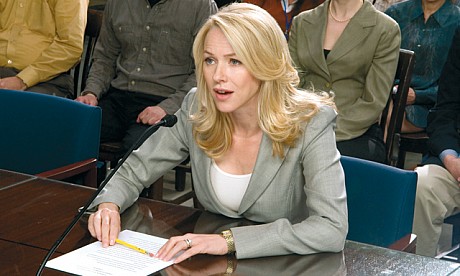Fair Game (2010)

Director Doug Liman, who scored a major international hit with The Bourne Identity, returns to the political thriller arena, this time on a less violent and more reality based scale with Fair Game, the true story of how CIA agent Valerie Plame was famously ‘outed’ to the press by someone within George W. Bush’s administration , effectively ending her career as a field agent.
At the time, Plame (Watts, You Will Meet a Tall Dark Stranger) had been very busy in the task of searching in Iraq for evidence of WMDs (weapons of mass destruction), while her husband, U.S. diplomat (and former ambassador) Joe Wilson (Penn, What Just Happened), had been to Niger in order to verify a claim that Saddam Hussein had been seeking to acquire about 500 tons of enriched uranium from one of their facilities. While the CIA and Wilson could find no evidence of such a deal, and even questioned the possibility of it ever being accomplished, the White House, spurred on by Vice President Dick Cheney, had been ramping up for a major push to go take down the Hussein regime, trying to use evidence of Hussein’s attempt to build a nuclear device as an excuse to go to war. When President Bush used Wilson’s trip to Niger as part of the evidence in his State of the Union address, Wilson became so inflamed at the misinformation that he wrote a scathing op-ed piece for the New York Times that resulted in someone working for the White House to leak the name of his wife Valerie to the press, a felony, exposing her to all of the undercover operations that she had going on in the Middle East.
Screenwriters Jez Butterworth (The Last Legion, Birthday Girl) and John-Henry Butterworth take on the herculean task of combining recollections from two memoirs, Valerie Plame’s own, “Fair Game”, and Valerie’s husband Joe Wilson’s, “The Politics of Truth”, and making a narrative out of it that can be enjoyed as a stand-alone film. Obviously, both authors have an axe to grind against the Bush Administration for what they consider to be treasonous acts committed against them, but in truth, it’s the expose on how the Bush Administration drummed up evidence to the congress and American public to support an act of war against a country they had been reportedly planning to invade before the 9/11 attacks. Much of the film showcases not only how difficult it had been to get the truth out to the American public through the press, but also how the press deliberately would antagonize the couple, eventually causing great strains in the marriage, as well as changing the dynamic of friendships they once held dear.
Outside of the involvement of the two high caliber lead actors of the film, much of Fair Game feels like television movie material that somehow became a push for a major motion picture release. Watts and Penn deliver the quality performances you’d expect nonetheless, but as more time passes from the incidents in the film, the smaller the potatoes seem in terms of how the events matter in the grand scheme of things. It is interesting from the point of how a government tries to manufacture reasons to go to war, though not particularly telling in terms of the underlying reasons why the war with Iraq had been considered worth undertaking. While the scenes of how the outing affected Plame’s career arc, as well as how much of a hardship it caused to her marriage, are interesting on a small scale, it doesn’t pass the gravitas test when it comes to big screen movies that strive to command our attention. It is painful to see how a family could be ripped asunder by a government without a conscience at its core, particularly for those poor informants who may have lost their livelihoods, if not their actual lives, in the hands of a woman they trusted who was no longer there to protect them. That might have made for a better film than whether or not Plame has been disgraced by the White House and press claiming that she served as nothing more than a secretary for the CIA.
If you’re at all interested in the Plame story and just don’t feel like reading her book, I suppose the film might be enough sate your interest in short fashion. Fans of the leads might also decide to give the film a go for their strong performances throughout. It is competently made, hits all the right notes, and runs at an efficient clip, enough to be watchable for those looking for an interesting political thriller. However, one can’t help but shake the feeling that the story is better off playing on the small screen, where personal interest stories set amid an important backdrop are the bread and butter of cable and network movies of the week just like Fair Game.
Qwipster’s rating: B
MPAA rated: PG-13 for some language
Length: 108 min.
Cast: Naomi Watts, Sean Penn, Ty Burrell, Noah Emmerich, Bruce McGill, David Andrews, Sam Shepard
Director: Doug Liman
Screenplay: Jez Butterworth, John-Henry Butterworth (based on the books, “The Politics of Truth: Inside the Lies That Led to War and Betrayed My Wife’s CIA Identity: A Diplomat’s Memoir” by Joe Wilson, and, “Fair Game: My Life as a Spy, My Betrayal by the White House” by Valerie Plame)
